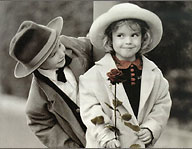
| Category - Little Girls Essay by Letty Cottin Pogrebin Henry James once said that the two most beautiful words in the English language are "summer afternoons." Obviously, he'd never heard the words "little girls." Whether it's the elfin damsels in these photographs or any Muffet you've enshrined on a tuffet of memory, little girls are the human embodiment of all things sweet and lovely. Little girls are summer afternoons. Also ice-skating ponds and warm chocolate pudding. Straw bonnets worth satin streamers Pretend tea parties. Arms open wide for a hug. Little girls personify trust and purity, our once and future innocence, unsullied and unscarred. But sweetness accounts for only half their glory. The other half is grit - the firm set of a small jaw, the strength and reach of sturdy arms and legs, the courage that inspires our daughters to outgrow us in every way. That today's little girls can be both beautiful and brave is one to the lasting rewards of 20th-century feminism. That I gave birth to two wee wonder women - twins who are now in their thirties with children of their own - is one of the eternal miracles of my life. Entering time's tunnel, I can conjure my little girls with ease. The memories, sweet and savory, bubble up with unfailing effervescence. In one precious image, Abigail and Robin are two-and-a-half years old, flower girls at an uncle's wedding. As instructed, they toddle down the aisle in their white organdy dresses, carrying wicker baskets from which they carefully extract one rose petal at a time and drop it to the floor. Suddenly, Robin looks behind her at the trail of flowers on the carpet. "Uh-oh," she says to her sister. "Mustn't litter." Then, faces clouded with concern, they retrace their steps, pick up the petals and replace them in the baskets. They were good girls. But also fold and creative, joyful and funny. At three, elbows scrimmaging behind the living room drapes, their baby voices called out, "Take your seats. Curtain going up." Moments later, they burst out the folds singing the civil rights anthem, "We Shall Not Be Moved." Though both turned out to be writers, their childhood was about performance. They loved to entertain and mounted literally hundreds of extravaganzas, from nursery rhyme cabarets and tu-tu dance concerts to elaborate theatrical productions. Makeshift stages were always materializing between closet doors and tacked up sheets. My wardrobe was their costume chest. Their younger brother David and assorted friends were enlisted to play multiple roles, from the Tin man to Toto, from Kanga and Roo to Nancy Drew. As their tastes and talents matured, they learned to play the guitar, do impersonations and foreign accents, act scenes from Broadway shows. Best of all were the original works "Written, Directed, and Choreographed by Abigail and Robin." Our house has been a far less magical place since our little girls grew up. Images fall from the past like pressed roses. In every scene, I confess with some embarrassment, I remember what my daughters wore. I loved dressing them up. Today, when they browse through family albums, they can't believe their feminist mother sent them into the world wearing bonnets and berets, floored-length dresses, velvet jumpers, flowered tights, and patent leather Mary Janes. But I did and I'd do it again in a heartbeat. The other day, I was sitting on a place next to a little girl who took me back thirty years. She was three or four, wearing a smocked calico dress of the sort I used to favor for my daughters. Her hair was cut in bangs, like theirs, a cross between Buster Brown and Louise Brooks, and she had big brown eyes and a chirpy voice and was just as impatient as I was about being stuck on the runway. "When are we blastoffing?" she asked her daddy. He grinned at me and said, "Don't you just love this age?" Yes, I love that age, its inventiveness, its fresh take on the world, its unmitigated chutzpah. Robin and Abigail always coined their own phrases and spoke their minds. "I'm starving tired," they'd say. Or, "There's no room on you lap because you breasts are the way." Suddenly, I missed my children's childhood with a longing as deep as a sigh. I wish we could start al over again, but that's what grandchildren are for. After Robin and Abigail each had a baby boy, they are now turning out daughters. "Sons branch out, but one woman leads to another," wrote Margaret Atwood in "Five Poems for Grandmothers," and like millions of women before me, I feel cradled in the web of female continuity. With my daughters as their mothers, my granddaughters are guaranteed a lifetime supply of girl-grit and gumption. My job is simple this time around - to cherish them and enjoy their company, to be their advocate and confidante, and to buy them velvet dresses, white tights, and Mary Janes. And maybe some matching bonnets. |
|
Categories |
|
First Love << Thoughts << Friendship << Let's Pretend << Little Girls << Little Boys << Image Collection << Multimedia << About the Artist << Purchase the Book << Kim Anderson Links << Contact Me here << Return to Main Page << |